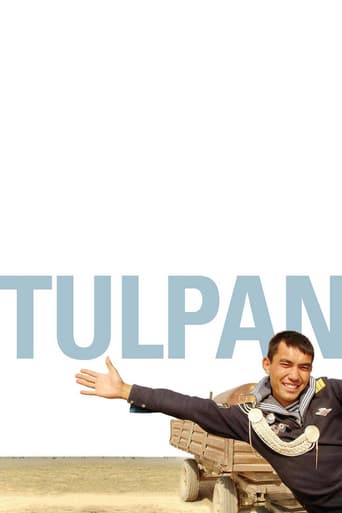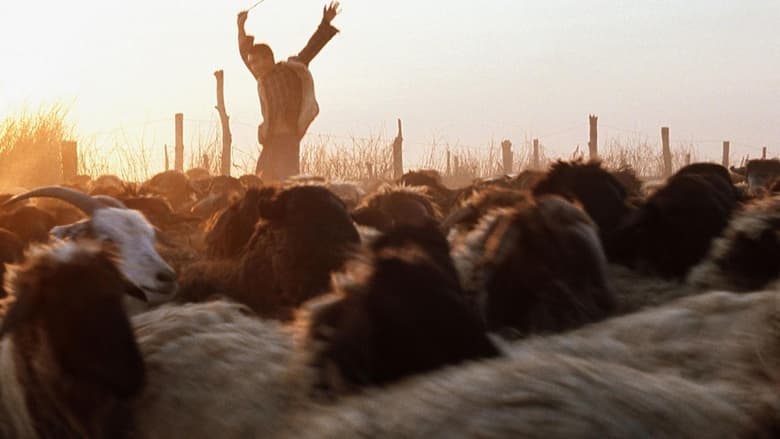

Tulpan (2009)
Asa, a young and cheerful dreamer, returns from his Russian naval service to his sister’s nomadic family on the desolate Hunger Steppe of central Asia, so that he can begin his own life as a shepherd. But before he can tend a flock of his own, Asa must first win the hand of the only eligible girl for miles—his mysterious neighbor, Tulpan.
Watch Trailer
Cast
Reviews
I think this is a new genre that they're all sort of working their way through it and haven't got all the kinks worked out yet but it's a genre that works for me.
The performances transcend the film's tropes, grounding it in characters that feel more complete than this subgenre often produces.
Go in cold, and you're likely to emerge with your blood boiling. This has to be seen to be believed.
Although I seem to have had higher expectations than I thought, the movie is super entertaining.
Sergei Dvortsevoy's Tulpan is a really mature and really quite fascinating mediation on a young man's angst, as well as his apparent unrequited love; life as a Kazakh farmer living in rural nowhere; contemporary culture clashing with more classical stances and the telling of a great friendship between two young men. The film at once recalls the work of Iranian directors Abbas Kiarostami and Mohsen Makhmalbaf, specifically, both the sorts of material combining with the very specific aesthetics applied to two of their films in 1998's Taste of Cherry and 1996's Gabbeh, respectively. Similalrly, it owes a great deal of debt to some of the Italian neo-realist works of the 1940s and 50s; the film coming to resemble as much an articulate tale about characters going through transitions and suffering hardships as it is a raw and uncompromising depiction of life in the barren locale in which it's set. Where something like De Sica's The Bicycle Thieves may have used causality, plot mechanisms and catalysts to drive its lead through a story set in a world which would eerily double up as echoing its own frightening reality; Dvortsevoy, here, draws on similar approaches and depicts life set amidst a Kazakh locale known as 'Hunger Steppe', as those whom inhabit it just seem to fall in to proceedings.The lead is a certain Asa (Kuchencherekov), a young man in his twenties recently discharged from the Russian Navy, returning to what we presume to be a locale similar to his own roots so as to rendez-vous with his sister Samal (Esljamova); a woman living with her husband Ondas (Besikbasov) and three children in a small tent-like structure on their farm. Dvortsevoy's film is a bare-all look at life upon this locale, when particular characters are rounding up cattle and a large whirlwind of sand and dust kicks up nearing itself to the livestock, that's a true-to-life event captured in its rawest form on film and incorporated into the text going on to not only affect the characters we're identifying with, but doubling up to outline life as it is in this exact zone. Tulpan unfolds in a locale in which the sands and outback of the place surrounds the farm in all directions, while expansive hills and mountains spreading all the way out to the horizon provide the place with an intimidating and surreal edge, as if there is nothing in any direction for several hundred miles and you're cut off in precisely where you're based. That sense of being trapped feels prominent, so much so that when one character expresses his wishes to expand one's position in life to broaden out elsewhere, that agonising and desperate sense of it having little chance comes about.Asa and his tractor-driving; all singing, all smiling Boney-M loving friend Boni (Baisakalov) look to elevate their positions in life, the film beginning in the small tent of a neighbouring family as Asa pines for the titular Tulpan's hand in marriage, she being the daughter of a wealthy, land-owning unit. The pair of them linger on magazines detailing certain pieces of American iconography such as expensive land-cruisers to replace worn out farming vehicles; modern apartments to replace minute make-shift tents and the golden gate bridge to replace the searing travelling in a single direction for long stretches of time across sand and nothingness. The two boys are very much a part of a newer, more contemporary Kazakh mindset of elevating their positions in the world; building to the ownership of more grandeur things and climbing the proverbial ladder you might say formulates something resembling The American Dream. Ondas, whom represents a lesser contemporary, more classical mindset, stands in opposition to this thinking pattern; the notion of he being of a generation brought up prior to independence whilst still under Soviet rule feeling prominent.In the mean time, Asa wants to own farmland; Tulpan's unwillingness to take his hand in marriage the only thing stopping young Asa from living his dream and that notion of whether Asa wants to effectively marry into her family so as to attain this or whether he genuinely loves her as who she is, is neatly captured by Dvortsevoy. The severity of the situation is highlighted to the lead during the opening few minutes when, following the attempt to come to some arrangement with Tulpan's family, Ondan points out that there are no longer any women left for Asa to marry. Not that this deters the man, his prolonged attempts at wooing Tulpan, whom more often than not is either kept off screen or whose face remains elusive to proceedings, veers the film away from its pseudo-documentary roots that are combining with light comedy anyway, and into doomed romance and a far bleaker tone. It is revealed Tulpan's family are careful in whom they select to marry their daughter and whilst it is her future being discussed, Tulpan is relegated to peering through beaded strings formulating a make-shift door as her father in the business management field instigates a class war into the film by rejecting what is effectively a 'pitch' on behalf of Asa and an extension of his family.All of these ingredients are woven into the film rather spectacularly, if one were to stagger away from the film feeling as if it is like nothing one has ever seen before, then the chances are it will be because such approaches to such material have rarely been explored within such a locale as the expansive, desolate, barren terrain of a vast Kazakh steppe. This Kazakh, multiple award winner and Foreign Language Oscar representative culminating in a really quite engrossing and rather eye-opening account of dreams; trials; tribulations; clashes, of both a generational and class related nature, as well as a rarely depicted lifestyle brought to life in the most arresting of fashions.
One of the reasons I like to watch movies from around the world is too observe the different locations, be they city or country. A while back I watched "Tony Manero", shot in Santiago Chile, in which the city setting was about the most desolate and depressing locale I've ever seen. The setting in Tulpan is certainly desolate, but it's not depressing. Having lived part of my younger life in places like that, it's almost uplifting.As are the cast. Samal Esljamova is one of the beautiful women I've ever seen. The kids are delightful - Maha the singer, Beke the news reciter, the little one who seems to enjoy taunting and annoying Beke. Beke seems to be the only one aware of the camera - I had the feeling that if the camera wasn't there, the little one might have received a few clips across the ear-hole.Boni is funny, and the episode with the vet is fascinating. I wasn't sure how scared of the mother camel the cast really were, but it certainly seemed real enough. The little touches were done so well - the relationship between Tulpan's parents for instance - the stoic mother, the father trying to exert his authority and being studiously ignored.And then comes the climactic scene, the birth of the lamb. Both this, and the previous scene in which Ondas attempts to revive a dying lamb, were just riveting to watch. For sure, the actor playing Asa didn't look too excited by it all, but the realism couldn't be faulted.I thought this was a great film, a film showing that despite the differences in how we live, we all share the same burdens and joys and ambitions.
Tulpan (2008) was directed and co-written by Sergei Dvortsevoy. This film was co- produced in five different countries, but filmed primarily on the Central Asian steppes of Kazakhstan. The movie is basically about unrequited love, but it has the feel of a documentary. (Tulpan is one of those movies where the first thing you do when you return home is to check out its country of origin in Wikipedia!)Boiled down to basics, the film is about Asa, who has returned home to Kazakhstan after serving in the Russian navy. Now he wants to find a wife and settle down to the nomadic life style that apparently still exists in this harsh and unforgiving landscape.Asa loves the beautiful Tulpan, whom he has barely glimpsed and we never see. While he is courting her he lives with his sister, her husband, and their three children. Asa apparently was a good sailor, but he's not really adept at the skills needed for life on the steppes. His brother-in-law wants him to leave, his sister wants him to stay, and Asa can't decide what he wants to do, or even what he'll be able to do.I know very little about life lived in a yurt on the Asian grasslands. As this life is portrayed in the movie, it's not meant for dreamers or amateurs. People speak of the harsh beauty of the landscape, but I don't see it. (Well, I see the harsh part, but not the beauty. To me it looks cold, dusty, dry, windy, and forbidding.) Our species is very adaptable, and it's no surprise that a lifestyle has evolved that allows humans to survive in this environment. Whether Asa will choose that lifestyle, and whether he will survive it if he does choose it, are at the heart of the plot.At the heart of the movie are the images of the Steppes of Central Asia, and the few rugged people who live there.
Winner of the Un Certain Regard award this year at the Cannes Film Festival, the fast disappearing world of nomadic sheep herders in Kazakhstan is dramatized in the part fictional, part documentary film Tulpan. Directed by Sergei Dvortsevoy, Tulpan is the story of an ex-sailor seeking to marry the only available woman in the area to fulfill his dream of tending his own flock. The narrative, however, is secondary to the dramatic on-camera birth of a lamb and the spectacular scenery of the steppes. Much of the film takes place in the tent house called a yurt that is shared by Asa (Askhat Kuchinchirekov), his brother-in-law Ondas (Ondasyn Besikbasov), his older sister Samal (Samal Yeslyamova), and three children.The smallest boy is an absolute delight running and shouting as he plays with sticks and his pet turtle. His older brother has the uncanny knack of repeating the news broadcasts he hears on the radio word for word, reciting recites them daily to a curious Ondas. The only shrill note in the film is the constant high-pitched singing of Asa's niece Maha (Mahabbat Turganbayeva) who sings the same drone-like folk song six or seven times. As the film opens, Asa, his best friend Boni (Tulepbergen Baisakalov), and Ondas visit the family of Tulpan, a young woman whom they want Asa to marry. In southern Kazakhstan, the terrain is so forbidding that a herdsman must have a wife to do the chores while he tends his sheep and Ondas considers Asa too irresponsible and immature to be a herdsman without a wife.At the family gathering (Tulpan is not present) Asa makes up stories about his adventures in the Russian navy and how he fought an octopus in a life and death struggle. Tulpan's parents, however, are unimpressed and later tell Asa that their daughter (who is never seen in the film) has rejected him because his ears are too big. How she might have known that is not made clear but it leads to a comic comparison of Asa's ears to a picture of Prince Charles. Discouraged, Asa threatens to leave the steppe and move to the city with Boni but is reluctant to give up either his dream of marrying Tulpan or learning about animal husbandry.As Asa tries to prove himself to Ondas whose herd of sheep is plagued by a series of mysterious deaths, he assists in the birthing of a lamb and meets his severest test. Tulpan is a natural showcase for the region and Cinematographer Joly Dylewska captures the swirling dust and the stark landscape with striking success. One of the best scenes is that of a bandaged camel placed in a motorcycle sidecar by a veterinarian (Esentai Tulendiev) while the mother paces in the background. Not a dry National Geographic Special, Tulpan has ethnic and pop music, adorable children, moments of wicked humor, and an unforced naturalism that is captivating.


